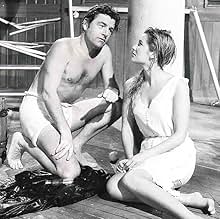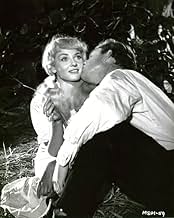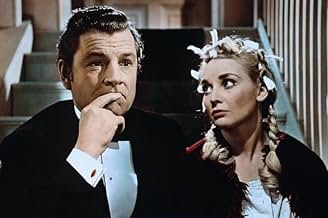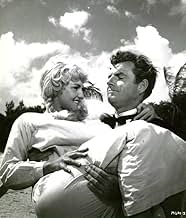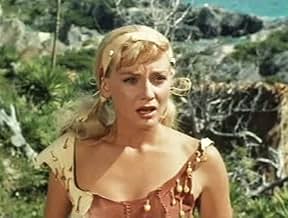IMDb-BEWERTUNG
7,1/10
2172
IHRE BEWERTUNG
Füge eine Handlung in deiner Sprache hinzuIn 1905, Lord Henry Loam and his family and servants are shipwrecked on a deserted island where the survival of the fittest renders the rigid class system irrelevant.In 1905, Lord Henry Loam and his family and servants are shipwrecked on a deserted island where the survival of the fittest renders the rigid class system irrelevant.In 1905, Lord Henry Loam and his family and servants are shipwrecked on a deserted island where the survival of the fittest renders the rigid class system irrelevant.
- Regie
- Drehbuch
- Hauptbesetzung
Jack Armstrong
- Guest at Ball
- (Nicht genannt)
Empfohlene Bewertungen
J.M. Barrie's 1902 play, THE ADMIRABLE CRICHTON, illogically and crudely renamed for its U.S. release PARADISE LAGOON in reference to the setting of Barrie's transformative second and third (of four) acts, treats such universal themes of natural leadership that it may well be one of the most successfully copied - dare one say plagiarized? - plots extant. It has been speculated that Barrie himself filched the idea of a group of privileged persons stranded on a deserted island from an 1896 German play, ROBINSON'S EILAND, where a secretary emerges as the leader.
In 1947, French playwright Andre Roussin (claiming to trace his story from a 1921 Catalan play, NEVERTHELESS CIVILIZED) reduced Barrie's assortment of shipwrecked privileged Britons and their servants to a mere handful to focus on one romantic triangle but retained Barrie's essential structure for his THE LITTLE HUT which proved almost as successful (and as frequently filmed) as the Barrie classic on both sides of the Atlantic. From 1964 to 1967, CBS Television in the U.S. mined essentially the same territory (if decidedly Americanized - transmuting a failed South Seas cruise to a disastrous "three hour cruise" out of Hawaii and reducing the sexual competition to favor the status/qualification competition humor which could be infinitely stretched out) with a situation comedy called GILLIGAN'S ISLAND.
While this 1957 (British) Columbia Pictures adaptation of the Barrie play inexplicably softens the overt sexual competition on the island for Kenneth More's Crichton's attentions between "name" performer Sally Ann Howes' Lady Mary and second billed Diane Cilento as the lower class "Tweenie" (a maid in training), it admirably presents the essentials of Barrie's play with the "perfect" British butler holding his "master's" household together both in England and on an isolated South Sea isle - while exploring how different qualities may bring different people to the fore under different circumstances.
The always perfect foil Cecil Parker as Lord Loam is excellent as the titular head of the British household who becomes a better man as he naturally falls into Crichton's role on the island and suffers great pangs when "normality" is restored on their return home. As uniformly solid as the entire cast is however, for many the standout performance will be Martita Hunt's (Lady Bracknell influenced) Lady Brocklehurst - a clear homage from Barrie to Oscar Wilde's greatest play, the 1895 IMPORTANCE OF BEING EARNEST. Lady Brocklehurst, protecting her "family name" before allowing her son to announce his engagement to Lady Mary, is determined to find out what *really* happened on the island. Her questioning - and the comic obfuscation which parries it - is right up there with Lady Bracknell's inquisition of Earnest prior to his engagement to Cecily in Wilde.
The final curtain of the film nicely preserves the tension for the audience Barrie wished as to how Crichton will actually wind up. It is said that Barrie himself toyed with an alternate ending with Crichton ending up in a more "romantic" liaison. Barrie came to the conclusion however, that his audience "would not stand it." It's hard to say today - either way it's a warm, bittersweet finish fully worthy of the journey getting there.
It is also worth noting that the recent British DVD reissue of the film restores Kenneth More to the cover - the previously most available VHS release mistakenly boasted the handsomer supporting player (as the author Ernest Wooley) Gerald Harper on its cover as the "admirable Crichton" - at the moment a rescuing ship is sited. That "pan and scan" Columbia/Tristar VHS Home Video release also only offered the U.S. "PARADISE LAGOON" release, even though clearly labeled THE ADMIRABLE CRICHTON (the better known original title).
Either way, it's well worth a look - and inexcusable that this classic isn't more readily available for broad viewing today.
In 1947, French playwright Andre Roussin (claiming to trace his story from a 1921 Catalan play, NEVERTHELESS CIVILIZED) reduced Barrie's assortment of shipwrecked privileged Britons and their servants to a mere handful to focus on one romantic triangle but retained Barrie's essential structure for his THE LITTLE HUT which proved almost as successful (and as frequently filmed) as the Barrie classic on both sides of the Atlantic. From 1964 to 1967, CBS Television in the U.S. mined essentially the same territory (if decidedly Americanized - transmuting a failed South Seas cruise to a disastrous "three hour cruise" out of Hawaii and reducing the sexual competition to favor the status/qualification competition humor which could be infinitely stretched out) with a situation comedy called GILLIGAN'S ISLAND.
While this 1957 (British) Columbia Pictures adaptation of the Barrie play inexplicably softens the overt sexual competition on the island for Kenneth More's Crichton's attentions between "name" performer Sally Ann Howes' Lady Mary and second billed Diane Cilento as the lower class "Tweenie" (a maid in training), it admirably presents the essentials of Barrie's play with the "perfect" British butler holding his "master's" household together both in England and on an isolated South Sea isle - while exploring how different qualities may bring different people to the fore under different circumstances.
The always perfect foil Cecil Parker as Lord Loam is excellent as the titular head of the British household who becomes a better man as he naturally falls into Crichton's role on the island and suffers great pangs when "normality" is restored on their return home. As uniformly solid as the entire cast is however, for many the standout performance will be Martita Hunt's (Lady Bracknell influenced) Lady Brocklehurst - a clear homage from Barrie to Oscar Wilde's greatest play, the 1895 IMPORTANCE OF BEING EARNEST. Lady Brocklehurst, protecting her "family name" before allowing her son to announce his engagement to Lady Mary, is determined to find out what *really* happened on the island. Her questioning - and the comic obfuscation which parries it - is right up there with Lady Bracknell's inquisition of Earnest prior to his engagement to Cecily in Wilde.
The final curtain of the film nicely preserves the tension for the audience Barrie wished as to how Crichton will actually wind up. It is said that Barrie himself toyed with an alternate ending with Crichton ending up in a more "romantic" liaison. Barrie came to the conclusion however, that his audience "would not stand it." It's hard to say today - either way it's a warm, bittersweet finish fully worthy of the journey getting there.
It is also worth noting that the recent British DVD reissue of the film restores Kenneth More to the cover - the previously most available VHS release mistakenly boasted the handsomer supporting player (as the author Ernest Wooley) Gerald Harper on its cover as the "admirable Crichton" - at the moment a rescuing ship is sited. That "pan and scan" Columbia/Tristar VHS Home Video release also only offered the U.S. "PARADISE LAGOON" release, even though clearly labeled THE ADMIRABLE CRICHTON (the better known original title).
Either way, it's well worth a look - and inexcusable that this classic isn't more readily available for broad viewing today.
Fabulous film with a moral to please all. Great cast, great story, great filming. One for everyone to
enjoy and not as hammy as some of these older films.
See it and judge for yourself !!
The 1957 version of the classic J.M. Barrie play -- yes, he wrote something besides Peter Pan -- benefits from its opening up, with a lot of shooting in Bermuda. Kenneth More is the butler who, when the yacht sinks, becomes the leader of the aristos by dint of his understanding that work must be done and how to do it; by the time they are unwillingly rescued, he's got the island organized and built up like a Buster Keaton set.
Cecil Parker plays his fuddy-duddy upper-class twit, but here clearly takes pleasure in playing against type in the scenes where he's Kenneth More's manservant. I thought it a bit odd that Diane Cilento played 'Tweenie' and Sally Ann Howes Parker's daughter; were I casting it, I would have switched those roles. Both ladies acquit themselves well. Martitia Hunt has a great small role as Lady Bracknell..... I mean Lady Brocklehurst.
Cecil Parker plays his fuddy-duddy upper-class twit, but here clearly takes pleasure in playing against type in the scenes where he's Kenneth More's manservant. I thought it a bit odd that Diane Cilento played 'Tweenie' and Sally Ann Howes Parker's daughter; were I casting it, I would have switched those roles. Both ladies acquit themselves well. Martitia Hunt has a great small role as Lady Bracknell..... I mean Lady Brocklehurst.
This movie pokes fun at the English class system, using a shipwrecked cast as a backdrop. Kenneth More plays a typically English Butler with plenty of savvy, and reverses roles with his Master, Lord Loam, played rather nicely by Cecil Parker. More's character shows wit and some creativity in adverse circumstances, and is charmingly played. Kenneth More looks distinguished in a dinner jacket however on the island scenes, he actually was photographed from the waist up, to disguise the fact that he was wearing shorts to help him deal with the heat on location. Great movie, and one I would very much like to own a copy of. If anyone knows how I might obtain one, please get in touch. My e-mail is firehouse5@gmail.com.
In 1904 the Loam house is one of the most prodigious in all England. The head butler of the household is Crichton, who knows his place and is keen to keep the staff downstairs despite his labour-voting master's support of the absurd idea of all men as equal. On a cruise of the South Seas the family and Crichton become ship wrecked and the social standards that once controlled the families are no more and the castaways soon realise the value of a useful man.
I watched this by pure chance and, judging by the number of votes on imdb against this title, it appears that few other people have sought this film out. This is a retelling of J.M. Barrie's role reversal comedy and, although not without it's flaws, it is quite an enjoyable and thought provoking tale. The plot is simple in that the film looks at the class system in the UK and switches it in a situation where practicality and leadership qualities mean more than birthright. Sadly in the UK we have historically had a class system that has decided from birth who you will be when you grow up if you're father was a Lord then you shall be too and so forth. That is the situation here and it is amusing to it switched when the island has no such system and eventually everyone settles into one based on merit and ability rather than birthright.
The film has a few digs at the ruling classes in the final 20 minutes, showing them as pompous and perhaps not as honourable as they should be, meanwhile Crichton lives up to the character given him by the film's title. It is actually quite sad when the film returns to England because in this one man you do get to see the crushing and enslaving effect that the class system has on those born into the lower reaches of it. The comedy is rarely hilarious but is amusing throughout especially before the social switch occurs. It may feel a little old fashioned now but it is pretty light and enjoyable. If it does have a flaw it is that the jump between social status is sudden and not phased in slowly I know the film had limited time but it was a little hard to swallow all at once. Also, on return to England the film loses a little of it's sharpness and enjoyment value.
Moore is perfectly cast as the unflappable butler Crichton he is perfect but as someone who knows his place, but also convinces as someone whom is a born leader regardless of birth right. Parker plays Loam spot on and the support cast are all well played if a little unmemorable in the odd spot.
Overall this is a quaint little film that makes a very good point. Although we are a classless society by comparison to the events in this film, class and birthright still play a big part in deciding what you'll become in later life in the UK. This is an amusing film with still a thoughtful message.
I watched this by pure chance and, judging by the number of votes on imdb against this title, it appears that few other people have sought this film out. This is a retelling of J.M. Barrie's role reversal comedy and, although not without it's flaws, it is quite an enjoyable and thought provoking tale. The plot is simple in that the film looks at the class system in the UK and switches it in a situation where practicality and leadership qualities mean more than birthright. Sadly in the UK we have historically had a class system that has decided from birth who you will be when you grow up if you're father was a Lord then you shall be too and so forth. That is the situation here and it is amusing to it switched when the island has no such system and eventually everyone settles into one based on merit and ability rather than birthright.
The film has a few digs at the ruling classes in the final 20 minutes, showing them as pompous and perhaps not as honourable as they should be, meanwhile Crichton lives up to the character given him by the film's title. It is actually quite sad when the film returns to England because in this one man you do get to see the crushing and enslaving effect that the class system has on those born into the lower reaches of it. The comedy is rarely hilarious but is amusing throughout especially before the social switch occurs. It may feel a little old fashioned now but it is pretty light and enjoyable. If it does have a flaw it is that the jump between social status is sudden and not phased in slowly I know the film had limited time but it was a little hard to swallow all at once. Also, on return to England the film loses a little of it's sharpness and enjoyment value.
Moore is perfectly cast as the unflappable butler Crichton he is perfect but as someone who knows his place, but also convinces as someone whom is a born leader regardless of birth right. Parker plays Loam spot on and the support cast are all well played if a little unmemorable in the odd spot.
Overall this is a quaint little film that makes a very good point. Although we are a classless society by comparison to the events in this film, class and birthright still play a big part in deciding what you'll become in later life in the UK. This is an amusing film with still a thoughtful message.
Wusstest du schon
- WissenswertesFor much of his role as Bill Crichton, Kenneth More was filmed from the waist up to hide the fact that he was wearing shorts with his dinner-jacket because of the heat during filming.
- PatzerWhen land is first sighted, Tweeny has only one arm on the oar when the binoculars are passed to Crichton. In the next shot, when Crichton is looking through the binoculars, she has both arms on the oar.
- Zitate
Lady Brocklehurst: George... Listen when anyone begins to answer with "The fact is... "
Brocklehurst: But why, mother?
Lady Brocklehurst: Because that is, usually, the beginning of a lie.
- Crazy CreditsOpening credits prologue: LOAM HALL ENGLAND 1905
- VerbindungenFeatured in Talkies: Remembering Kenneth More: Part One (2019)
- SoundtracksMolly Malone
(uncredited)
Generally regarded as a traditional song, but lyrics are sometimes attributed to James Yorkston with music arranged by Edmund Forman
Sung by Cecil Parker (Lord Loam) on the island
Top-Auswahl
Melde dich zum Bewerten an und greife auf die Watchlist für personalisierte Empfehlungen zu.
- How long is Paradise Lagoon?Powered by Alexa
- What is The Admirable Crichton' about?
- Is 'The Admirable Crichton' based on a book?
- What is a suffragette?
Details
- Erscheinungsdatum
- Herkunftsland
- Sprache
- Auch bekannt als
- Paradise Lagoon
- Drehorte
- Bermuda(desert island - Stonehole Bay, Chaplin Bay and Jobson's Cove)
- Produktionsfirma
- Weitere beteiligte Unternehmen bei IMDbPro anzeigen
- Laufzeit1 Stunde 34 Minuten
Zu dieser Seite beitragen
Bearbeitung vorschlagen oder fehlenden Inhalt hinzufügen

Oberste Lücke
By what name was Zustände wie im Paradies (1957) officially released in India in English?
Antwort



